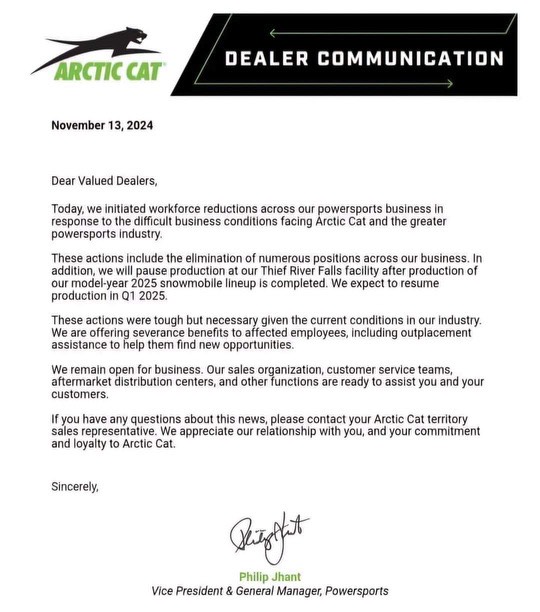Arctic Cat lays off dozens, pauses production at Thief River Falls facility; industry trending down
Dozens of workers at a decades-long Minnesota snowmobile maker have been laid off.
Arctic Cat informed their dealers this week in a letter and shared “current conditions in our industry” as at least one reason.
The company, headquartered in Thief River Falls and owned by Rhode Island-based Textron, confirmed the news with 5 EYEWITNESS NEWS through a spokesperson who wrote in part that “Arctic Cat made workforce reductions at our Thief River Falls facility on Wednesday.”
They also stated that “About 65 employees at the Thief River Falls facility were affected. Affected employees are eligible for severance benefits, including outplacement assistance to help them transition to new opportunities.
In addition, we will furlough much of our hourly production workforce in Thief River Falls until early next year, when we expect to resume production. Once production resumes, furloughed employees will be able to return to work.
We thank our employees for their service and contributions to our company’s success, and wish them well in their next endeavors.”
This isn’t the only Minnesota based snowmobile maker feeling the crunch of an industry facing challenges. Last month, Medina-based Polaris reported a more than 80% decrease in Quarter 3 earnings compared to last year.
And while economics is a factor, Mother Nature wasn’t too kind to the industry this last year either.
“We’re coming off the first snowless winter that I have experienced in the 29 years I’ve been in the power sports business,” John Wooden, president of River Valley Power Marine, said.
“That, coupled with unprecedented flooding, if you would, that made many of the lakes that we sell to for, [on the] boat side of the business, [and] rivers unnavigable all the way through the middle of July,” Wooden said about the tough year.
As for the money side of things, finance professor with St. Thomas University, David Yang, blames inflation and high interest rates as a more immediate impact. As for the long-term reasons, Yang says there are a few.
“One of them is demographics,” Yang told 5 EYEWITNESS NEWS, pointing to younger generations not being as interested in power sports.
“Another is government regulations,” Yang said, which leads to fewer places for people to ride these machines.
“And a third is electronics and digitization. The revolutions in being able to see the world through your phone outweighs the free sense of freedom you have by riding a motorsport,” Yang added.
You can view the letter shared by Arctic Cat below:
